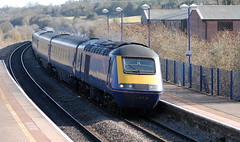
HST
Originally uploaded by Mike Knell.
The Department of Transport's consultants continue to develop a specification for a replacement for these trains, which were introduced in the mid-1970s.
The aim is to produce something which is suitable for all sorts of things, capable of being powered by diesel, electricity or some other form of traction as yet undiscovered. The idea is to have generator vehicles providing a power supply, with electric motors distributed along the length of the train beneath the carriages. Siemens has come up with a concept of this kind. The specification also requires much lower weights than has been usual in recent years, at around 36 tons per carriage. A carriage length of 26 metres is proposed.
But when you look at where the trains would run, it comes down to the Great Western main line, London to Aberdeen and a few for the Midland main line. But the GW line is very different to what it was when the HSTs came into service. Then, trains ran non-stop from London to Bath and Cardiff. Now, due to development in the M4 corridor, they have become stopping services, calling at stations every twenty miles or so. There is little high speed running any more on this route. And so London to Bristol and Cardiff should be electrified and a fleet of trains similar to those used on the Waterloo to Bournemouth and Portsmouth services obtained. This leaves the line to Devon and Cornwall to be dealt with, but a short extension of electrification would bring power to Salisbury, which is well laid-out for a change of traction, for example, to diesel. This is more than half-way to Exeter, and the route beyond, to Exeter needs to be upgraded anyway, with restoration of the double track main line.
As for the King's Cross to Aberdeen route - this is already electrified as far as Edinburgh and the smaller numbers travelling beyond do not need a full length train. So here, all that is needed is to split the train and take the Aberdeen section on using, say, diesel traction.
The Midland main line from London to Nottingham, Derby and Sheffield, is also much like the GW route, and ripe for electrification.
Which makes the requirement look a lot simpler. Surely all that is needed is a fleet of carriages made up into, say, 8-car and 5-car sets, which can be run in push-pull mode with any form of locomotive - electric, diesel or whatever?
The requirement for 26 metre long vehicles is worrying. The longer the vehicle, the narrower it has to be due to the overhang on curves. Trains in Britain are already too narrow. The optimum length is about 21.5 metres, allowing a width of 2.80 metres. But possibly a better solution altogether would be to use articulated push-pull units with 16 metre cars, similar to those which make up Eurostar/TGV trains. These can be built to the maximum permitted width in the UK, presently 2.82 metres, owing to the steadier ride which can be achieved through articulation, which also brings other benefits such as greater comfort and safety.
Kommentarer